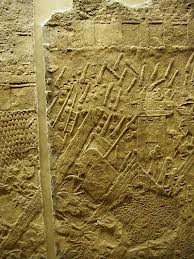DAY 160
DENIAL & REPENTANCE
2 Chronicles 32 & 33 and John 18:19-40
Sennacherib, King of Assyria was
notorious for his methods. Archeological finds regarding the city o Lachish are
widely documented. The most famous of these finds is called the Lachish Reliefs.
Some 8 feet tall and 80 feet long they chronicle a broad history, including
Sennacherib and his siege of Lachish. You can “goggle it” and see some amazing
cites. Here is a link: http://theosophical.wordpress.com/2011/08/16/biblical-archaeology-17-the-lachish-reliefs/
To broadly review, God’s people were
united under King David and then King Solomon. Around 900 BC we know that the
people split into two kingdoms. The northern kingdom, most often called Israel,
and the southern kingdom, most often called Judah. The north was geographically
larger, but the south is where Jerusalem and the Temple were located.
Around 720 BC the northern kingdom was
defeated by Sennacherib. This king was brutally real and now he turned his
attention to Jerusalem. The expanse of Sennacherib’s empire was great. Assyria
can be thought of as modern day Iraq. Yet amid this attack Hezekiah remains
faithful. We have read about this before in 2 Kings (18 and on). Evidence of
Hezekiah’s strategy is thought to still exist in what are commonly referred to
Hezekiah’s tunnels.
Remarkably, or maybe at this point you
don’t find it remarkable, after Hezekiah dies the next king, Manasseh does evil
in the sight of the Lord. Yet his denial ultimately leads to repentance and God
is once again merciful.
Denial and repentance: it seems
everywhere, even among Jesus’ closest friends. We read of Peter’s second
denial, and we read of how the people deny Jesus to Pilate. We have Pilate’s
famous question of “What is truth?”
How we determine truth is the subject
for another blog on another day. Some people rely on others such as a king, or
the Church, to determine it. Others rely on science, or the Bible, or their own
experience…most use a combination. The point we have seen over and over is that
when the people in the Bible have denied God, who is Truth, things do not go
well. The circumstances usually become so bleak that they turn back, they
repent, and return to God…and God who is infinitely faithful receives them.
Why is truth so hard to accept? Why did
the kings we have read about deny God and His Truth? If you add up all the
kings and keep score, those who “did good” and those who “did evil”…the evil
ones outnumber the good ones by a long shot. Why? Beyond them, why do I? This
is one of those questions for the ages, but before I fall into a philosophical
hole the reality is that there is enough data to demonstrate the un-deniability
of this situation.
Rather than deny this situation and
rather than obsess about why, I suggest we look not at ourselves, but at God.
What does God do amid all our denial? He stands faithfully by, waiting for our
return…and when we do He is quick to receive us…and for that we are grateful.

No comments:
Post a Comment